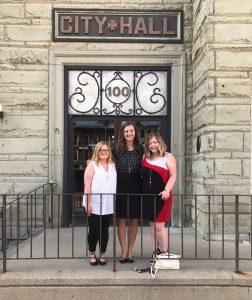
Jacqui Johns and fellow CFCI members at Georgetown City Hall the day the city council passed the conflict-free resolution
This blogpost was written by guest blogger Jacqui Johns, a Georgetown College graduate and Conflict-Free Campus Initiative leader.
When I started college, I knew nothing about the conflict in the Democratic Republic of Congo, let alone anything about the country. However, because of an introduction to a passionate Congolese student trying to bring the Enough Project’s Conflict-Free Campus Initiative (CFCI) to Georgetown College during my first semester there, I can easily say that the movement to end conflict in Congo has fueled my passion and efforts for the last four years as a student activist. CFCI is a student-led movement that works with campus administrations to pass procurement resolutions which commit the school to prioritizing purchasing from companies that are working to source conflict-free minerals from Congo for their products. Conflict minerals have fueled and continue to help sustain armed violence in eastern Congo, linking them to the deadliest conflict globally since World War II. Since that first introduction, even if I had wanted to, I could not escape the reality of this conflict as it touched other aspects of my life beyond my work with CFCI. Having two internships at Kentucky Refugee Ministries during my college career brought me face-to-face with Congolese refugees who had been forced to flee from their homes because of the violence.
Over the past three years as a CFCI Campus Organizer, I took on a new goal each year. My first year, I worked with university and high school students across the Midwest region in the United States to guide them in their endeavors to bring CFCI to their schools and pass a campus-wide conflict-free resolution. My second year, I focused on my own campus, helping build our college’s CFCI chapter and ultimately passing Georgetown College’s conflict-free campus resolution. Through this process, I discovered just how vital it was to create our group’s presence on campus and to build relationships with those who could serve as our support system and with those who would have a say in passing a resolution. On May 11, 2016, Georgetown College approved a resolution to support a procurement policy that addresses the use of conflict minerals in the school’s most commonly purchased electronic items.
Building on the success on my own campus, this past year, my third year as a Campus Organizer, I sought to pass a conflict-free resolution in my college town, Georgetown, KY. I had no clue how to even begin this process, but my fellow CFCI students and I talked to Enough Project’s Advocacy Manager Annie Callaway about the steps involved and felt that we were up for the challenge. Over the course of two semesters, our CFCI chapter organized community support, researched our city, wrote a letter to the city council, and communicated with all of the council members and the mayor’s office regularly — sometimes emailing multiple times a day! In our initial communications, we received pushback, hesitancy, and a sense that our requests were falling on deaf ears, but we kept pushing and when the time was right, we finally presented our proposed resolution at a city council meeting.
On June 12 this year, just over a year after my campus went conflict-free, the Georgetown city council passed a conflict-free resolution. The resolution commits the city to consider whether the electronics products it purchases contain conflict minerals from Congo and, where possible, favor purchasing from companies that are working to source verifiably conflict-free minerals for their products. I didn’t realize it at the time, but the past three years of dedication, hard work, and even the ups and downs with CFCI were building up to this point. There were definitely moments of discouragement and feelings of defeat that at times had me wondering if it would be possible to pass such a resolution. In the end however, as the city council acknowledged, it was our CFCI student’s persistence that won them over.
Our small cohort of students could not have done this without the incredible help and support of Ms. Callaway and the guidance from the City Attorney of Georgetown. Having my beloved college town pass a conflict-free resolution means even more to me than I can explain. CFCI and the success of passing a campus-wide, as well as, a city-wide conflict-free resolution have left me so encouraged to continue to stand up for causes I believe in, even when it may be half a world away, for this process has illustrated that each one of us has a voice, and I never want to let mine fall silent.

